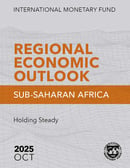This web page provides information on the activities of the IMF office in Seychelles, views of the IMF staff, and the relations between Seychelles and the IMF. Additional information can be found on the Seychelles and IMF country page, including official IMF reports and Executive Board documents.
At A Glance
• Current IMF membership: 191 countries
• Seychelles joined the IMF on June 30, 1977
• Total Quotas: SDR 22.9 million
• Outstanding Purchases and Loans: 90.58 million (March 31, 2023)
• Article IV/Country Report July 26, 2022
Office Activites
Resident Representative Office inaugurated its new training room.
Last month the Seychelles Res Rep Office inaugurated its new training room with an event for government officials and students from the University of Seychelles. The space, which holds 20-people, will provide Seychellois authorities an additional space to take the IMF online courses and host trainings and TA missions from AFRITAC SOUTH and HQ. It will also be used by economics students from the University of Seychelles. During the ceremony, the students were pleased to discover the list of trainings that they could benefit from and were delighted to learn that in some cases, there is a possibility to receive a certificate after the completion of the trainings.
November 29, 2023
Presentation of the April 2023 REO for Sub-Saharan Africa
The Resident Representative Office of the International Monetary Fund (IMF) in Seychelles has presented the April 2023 Regional Economic Outlook for Sub-Saharan Africa, on Wednesday June 21st at Maison de Mahé, Victoria. The presentation provided an opportunity to discuss the main findings of the report, namely the big funding squeeze which is afflicting the region. Present at the workshop were Officials from the Ministry of Finance, National Planning and Trade and the Central Bank of Seychelles.
June 21, 2023
Seychelles and the IMF
No results found. Either there was an error with the web service or there is no data returned by the web service.
Regional Economic Outlook
October 16, 2025

The outlook for Sub-Saharan Africa is showing resilience, despite a challenging external environment with uneven prospects in commodity prices, still tight borrowing conditions, and a deterioration of the global trade and aid landscape.
Read the Report
Departmental Papers on Africa
 The Departmental African Paper Series covers research on sub-Saharan Africa conducted by International Monetary Fund (IMF) staff, particularly on issues of broad regional or cross-country interest. The views expressed in these papers are those of the author(s) and do not necessarily represent the views of the IMF, its Executive Board, or IMF Management.
The Departmental African Paper Series covers research on sub-Saharan Africa conducted by International Monetary Fund (IMF) staff, particularly on issues of broad regional or cross-country interest. The views expressed in these papers are those of the author(s) and do not necessarily represent the views of the IMF, its Executive Board, or IMF Management.
Fraudulent Scam Emails
For more information please see Fraudulent Scam Emails Using the Name of the IMF



